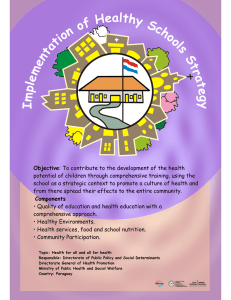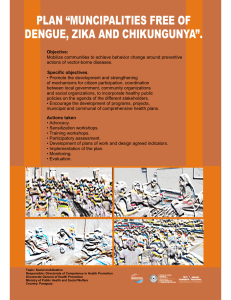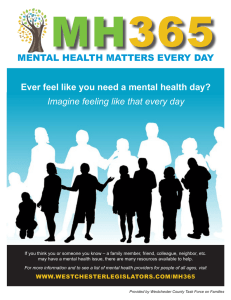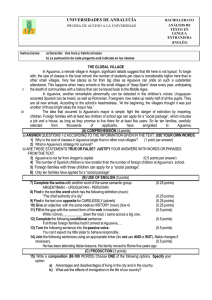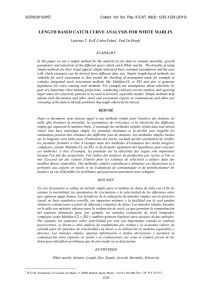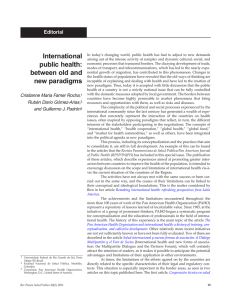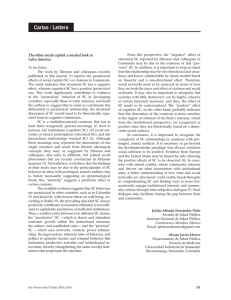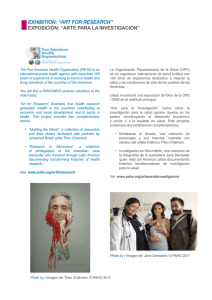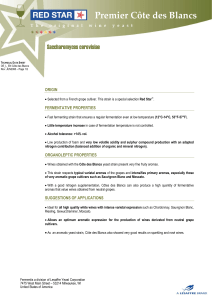Mental health care in Cambodia
Anuncio
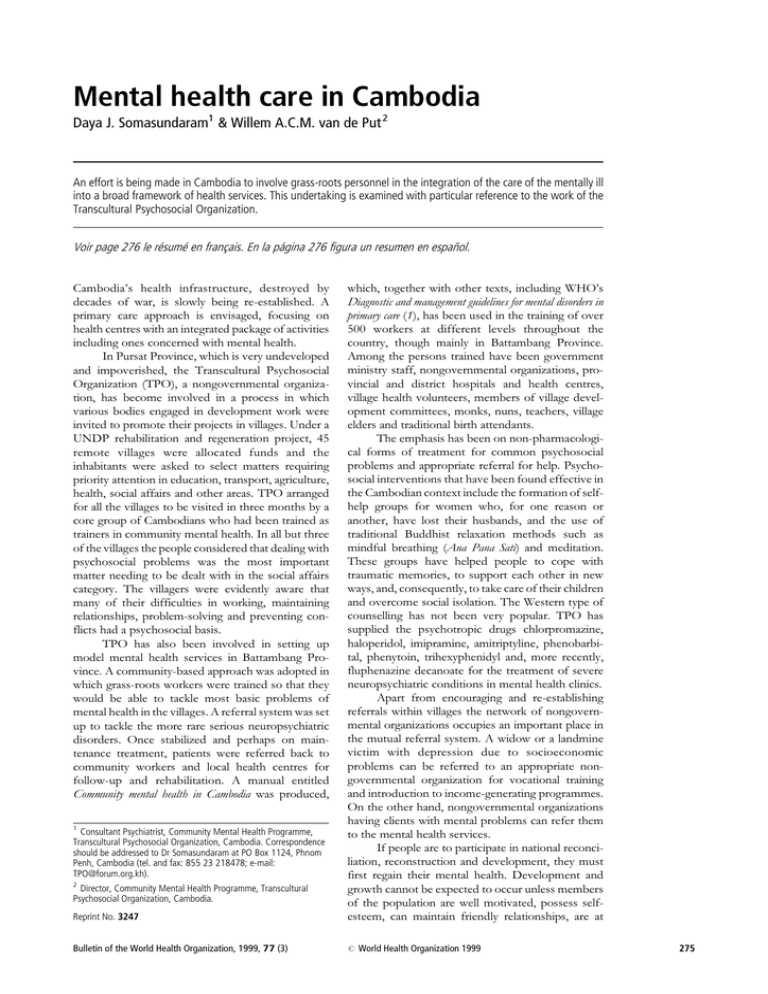
Mental health care in Cambodia Daya J. Somasundaram1 & Willem A.C.M. van de Put 2 An effort is being made in Cambodia to involve grass-roots personnel in the integration of the care of the mentally ill into a broad framework of health services. This undertaking is examined with particular reference to the work of the Transcultural Psychosocial Organization. Voir page 276 le reÂsume en francËais. En la paÂgina 276 figura un resumen en espanÄol. Cambodia's health infrastructure, destroyed by decades of war, is slowly being re-established. A primary care approach is envisaged, focusing on health centres with an integrated package of activities including ones concerned with mental health. In Pursat Province, which is very undeveloped and impoverished, the Transcultural Psychosocial Organization (TPO), a nongovernmental organization, has become involved in a process in which various bodies engaged in development work were invited to promote their projects in villages. Under a UNDP rehabilitation and regeneration project, 45 remote villages were allocated funds and the inhabitants were asked to select matters requiring priority attention in education, transport, agriculture, health, social affairs and other areas. TPO arranged for all the villages to be visited in three months by a core group of Cambodians who had been trained as trainers in community mental health. In all but three of the villages the people considered that dealing with psychosocial problems was the most important matter needing to be dealt with in the social affairs category. The villagers were evidently aware that many of their difficulties in working, maintaining relationships, problem-solving and preventing conflicts had a psychosocial basis. TPO has also been involved in setting up model mental health services in Battambang Province. A community-based approach was adopted in which grass-roots workers were trained so that they would be able to tackle most basic problems of mental health in the villages. A referral system was set up to tackle the more rare serious neuropsychiatric disorders. Once stabilized and perhaps on maintenance treatment, patients were referred back to community workers and local health centres for follow-up and rehabilitation. A manual entitled Community mental health in Cambodia was produced, Reprint No. 3247 which, together with other texts, including WHO's Diagnostic and management guidelines for mental disorders in primary care (1), has been used in the training of over 500 workers at different levels throughout the country, though mainly in Battambang Province. Among the persons trained have been government ministry staff, nongovernmental organizations, provincial and district hospitals and health centres, village health volunteers, members of village development committees, monks, nuns, teachers, village elders and traditional birth attendants. The emphasis has been on non-pharmacological forms of treatment for common psychosocial problems and appropriate referral for help. Psychosocial interventions that have been found effective in the Cambodian context include the formation of selfhelp groups for women who, for one reason or another, have lost their husbands, and the use of traditional Buddhist relaxation methods such as mindful breathing (Ana Pana Sati) and meditation. These groups have helped people to cope with traumatic memories, to support each other in new ways, and, consequently, to take care of their children and overcome social isolation. The Western type of counselling has not been very popular. TPO has supplied the psychotropic drugs chlorpromazine, haloperidol, imipramine, amitriptyline, phenobarbital, phenytoin, trihexyphenidyl and, more recently, fluphenazine decanoate for the treatment of severe neuropsychiatric conditions in mental health clinics. Apart from encouraging and re-establishing referrals within villages the network of nongovernmental organizations occupies an important place in the mutual referral system. A widow or a landmine victim with depression due to socioeconomic problems can be referred to an appropriate nongovernmental organization for vocational training and introduction to income-generating programmes. On the other hand, nongovernmental organizations having clients with mental problems can refer them to the mental health services. If people are to participate in national reconciliation, reconstruction and development, they must first regain their mental health. Development and growth cannot be expected to occur unless members of the population are well motivated, possess selfesteem, can maintain friendly relationships, are at Bulletin of the World Health Organization, 1999, 77 (3) # 1 Consultant Psychiatrist, Community Mental Health Programme, Transcultural Psychosocial Organization, Cambodia. Correspondence should be addressed to Dr Somasundaram at PO Box 1124, Phnom Penh, Cambodia (tel. and fax: 855 23 218478; e-mail: [email protected]). 2 Director, Community Mental Health Programme, Transcultural Psychosocial Organization, Cambodia. World Health Organization 1999 275 Policy and Practice peace with themselves and the environment and are confident enough to achieve their potential. Although mental health care cannot be given top priority it could be made part of an integrated service at the periphery. Nobody would deny that tuberculosis, malaria, AIDS and landmines present major problems in Cambodia. Well-being clearly has interconnected and interdependent physical, mental, social and spiritual dimensions, and a holistic approach to health is necessary so that most mental health problems can be solved in the community. Problems of HIV/AIDS, landmines and even tuberculosis are related to behaviour. With regard to tuberculosis, patients rarely complete a full course of treatment unless offered special inducements. Mental health problems are responsible for 8% of the global disease burden, a toll greater than that exacted by tuberculosis, cancer or heart disease (2), and 34% of all disability is caused by behaviour-related problems, including violence, exploitation, road traffic accidents, and AIDS (3). In Cambodia one could cite war, child abuse, sexual exploitation, domestic violence, trafficking, gambling, alcohol dependence and the use of landmines among the ReÂsume Les soins de sante mentale au Cambodge Au Cambodge, l'Organisation psychosociale transculturelle (OPT) a charge une eÂquipe de conseillers cambodgiens en sante communautaire de visiter 45 villages isoleÂs. Dans 42 de ces villages, une majorite d'habitants a juge qu'il eÂtait prioritaire, pour la vie eÂconomique et sociale, de trouver des solutions aux probleÁmes psychosociaux. Dans la province de Battambang, des agents de sante communautaires ont recËu une formation leur permettant de faire face aÁ la plus grande partie des probleÁmes courants de sante mentale observeÂs dans ces villages, et un systeÁme d'orientation-recours a eÂte mis en place pour les cas plus graves. Cette formation, sur la base d'un manuel national et de textes de l'OMS sur les soins de sante mentale au niveau de la communauteÂ, a eÂte dispenseÂe aÁ plus de 500 agents de santeÂ, parmi lesquels des volontaires de village, des personnels hospitaliers et de centres de santeÂ, des agents des pouvoirs publics, des agents du deÂveloppement, des religieuses, des enseignants et des accoucheuses Resumen La atencioÂn de salud mental en Camboya La Transcultural Psychosocial Organization (TPO) organizo la visita de un equipo de instructores de salud comunitaria de Camboya a 45 aldeas remotas de ese paõÂs. Una mayorõÂa de los habitantes de 42 de esas aldeas consideraba que la buÂsqueda de soluciones a los problemas psicosociales constituõÂa una prioridad fundamental para la vida econoÂmica y social de la comunidad. En la provincia de Battambang se adiestro a agentes de salud rurales para que aprendieran a abordar la mayorõÂa 276 serious behavioural problems that have psychosocial consequences. Much can be done to treat even rare psychotic conditions in peripheral hospitals by means of inexpensive drugs, good follow-up, and rehabilitation in the community. When adequate referral becomes available in Cambodian villages and the knowledge, skills and attitudes needed for managing most psychosocial problems in the community are acquired, a clear enhancement of self-sufficiency, self-esteem and motivation can be expected to develop, and productivity, healthy behaviour and the quality of life can be expected to improve. The best option for Cambodia, with no structures and resources in mental health other than in the traditional sector, and with 85% of its population living in rural areas, would be to adopt a community-based mental health programme founded on a policy of decentralization and integration of services. The aim should be to deliver adequate coverage of the population and for workers at community level to provide basic mental health care (4) as has been achieved elsewhere (5). n traditionnelles. Les traitements non psychiatriques eÂtaient privileÂgieÂs, y compris la creÂation de groupes d'auto-assistance ainsi que la me ditation et les techniques bouddhistes de relaxation. Pour les cas plus graves orienteÂs vers les dispensaires de sante mentale, l'OPT a fourni une gamme de meÂdicaments psychotropes. Les organisations non gouvernementales qui assurent par exemple des services de formation professionnelle et des activiteÂs geÂneÂratrices de revenus occupent une place importante dans le systeÁ me d'orientation-recours. La prise en charge des probleÁmes de sante mentale est consideÂreÂe comme essentielle aÁ la reconstruction nationale. D'autres probleÁ mes majeurs de sante , notamment le SIDA, les traumatismes causeÂs par les mines antipersonnel et la tuberculose ont des effets psychosociaux et comportementaux de sorte qu'une approche pleinement inteÂgreÂe de la sante et du deÂveloppement paraõÃt eÂminemment souhaitable. de los problemas baÂsicos de salud mental observados en esas aldeas, establecieÂndose un sistema de derivacioÂn de casos para los trastornos maÂs graves. Con la orientacioÂn de un manual nacional y de textos de la OMS sobre la atencioÂn de salud mental de base comunitaria, se ofrecio formacioÂn a maÂs de 500 agentes de salud, incluidos voluntarios de aldea, personal de hospitales y de centros de salud, funcionarios, agentes de desarrollo, monjas, maestros y parteras tradicionales. Se dio preferencia a los Bulletin of the World Health Organization, 1999, 77 (3) Mental health care in Cambodia tratamientos no farmacoloÂgicos, entre ellos la formacioÂn de grupos de autoayuda y el recurso a teÂcnicas de meditacioÂn y a meÂtodos budistas de relajacioÂn. La TPO suministro diversos medicamentos psicotroÂpicos para los casos maÂs graves derivados a dispensarios de salud mental. Las organizaciones no gubernamentales que ofrecen servicios tales como actividades de formacioÂn profesional y de generacioÂn de ingresos son un componente importante del sistema de derivacioÂn de casos. Se considera que la recuperacioÂn de la salud mental es un requisito de la reconstruccioÂn nacional. Otros problemas sanitarios graves, como el SIDA, los traumatismos por minas terrestres y la tuberculosis, presentan tambieÂn facetas psicosociales y comportamentales, de ahõ la necesidad de un enfoque plenamente integrado de la salud y el desarrollo. References 1. World Health Organization. Diagnostic and management guidelines for mental disorders in primary care. GoÈttingen, Hogrefe & Huber, 1996. 2. World Bank. World development report 1993: investing in health. New York, Oxford University Press, 1993. 3. Desjarlais RL et al. World mental health. Problems and priorities in low-income countries. New York, Oxford University Press, 1995. Bulletin of the World Health Organization, 1999, 77 (3) 4. The introduction of a mental health component into primary health care. Geneva, World Health Organization, 1990. 5. Report from the WHO collaborative study of strategies for extending mental health care. Geneva, World Health Organization, 1981. 277
